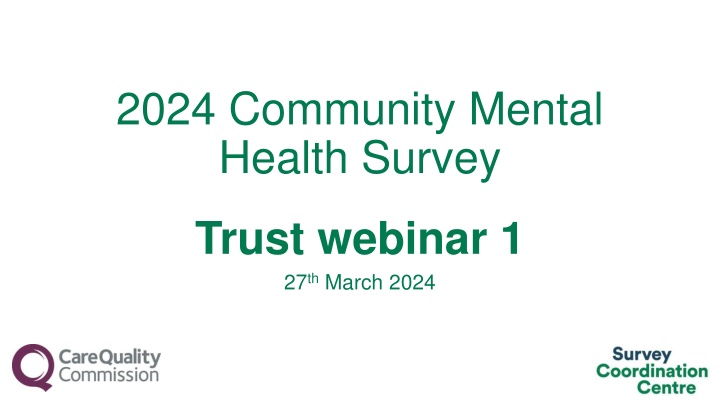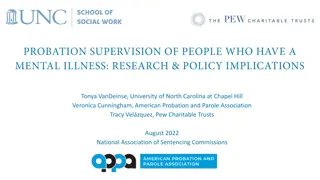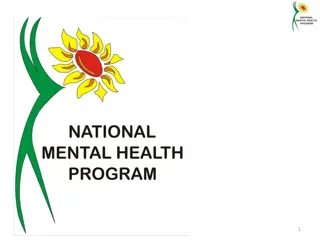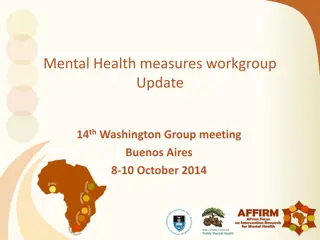Community Mental Health Survey Trust Webinar Overview
Conducted annually since 2004, the Community Mental Health Survey Trust Webinar provides insights into mental health services, participation, results usage, and eligibility criteria. The survey's impact on NHS performance, CQC assessments, and service improvement planning is highlighted, emphasizing the importance of user feedback and engagement activities. Boosting samples for granular reporting and development areas in primary care models are key aspects discussed in the webinar.
Download Presentation

Please find below an Image/Link to download the presentation.
The content on the website is provided AS IS for your information and personal use only. It may not be sold, licensed, or shared on other websites without obtaining consent from the author.If you encounter any issues during the download, it is possible that the publisher has removed the file from their server.
You are allowed to download the files provided on this website for personal or commercial use, subject to the condition that they are used lawfully. All files are the property of their respective owners.
The content on the website is provided AS IS for your information and personal use only. It may not be sold, licensed, or shared on other websites without obtaining consent from the author.
E N D
Presentation Transcript
2024 Community Mental Health Survey Trust webinar 1 27thMarch 2024
Agenda Overview of Community Mental Health Survey (10 minutes) Development areas (45 minutes) Primary care Care Cluster Sex and gender variable Service level information Assessment Service Groups Engagement activities (20 minutes) Response rates 2023 engagement activities Increasing engagement with service users Increasing engagement with specific groups Key dates (5 minutes) Questions (10 minutes)
Overview of Community Mental Health Survey
Overview of Community Mental Health Survey Conducted almost every year since 2004 53 NHS trusts participated in 2023 Survey drew a random sample of 1250 service users to receive the survey. Trusts could also choose to boost their sample to receive feedback from a larger number of service users, potential for more granular reporting. We will be unable to provide majority trusts with data on CAMHS in 2023 results due to low numbers, boosting your sample increases the chance for granular reporting outputs. Care Quality Commission (CQC) use the results to assess NHS performance and for use within inspections, such as highlighting where there are safety concerns or examples of good care Results are also shared with NHS trusts, NHS England, Department of Health and Social Care for improvement planning.
Overview of Community Mental Health Survey Eligibility criteria: service users aged 16 and above accessing either Children and Adolescent Mental Health Services, Adult Mental Health Services or Older Adult Mental Health Services, AND with at least one contact (face-to-face, via video call or telephone) between 1stApril and 31stMay (the sample period), AND with at least one other contact (face-to-face, video call, telephone) either before, during or after the sampling period Mixed mode with a push-to-web approach 2023 results due to be published on 18thApril 2024 Beginning development of 2024 survey
Primary care - integrated community models of care The Community Mental Health Survey, collects feedback from service users on their experience with the team at the Community Mental Health Trust. Service users must have had contact with Community Mental Health Trust to be eligible for the survey. We are aware of the creation of local Community Mental Health Hubs Community trusts are working together with PCNs and GPs to deliver care based on the needs of the population. Questions on integration with primary care How is mental health care shared between trusts and primary care? Are there particular areas of care that only the trust mental health team provides? Does a patient know when they are receiving care from the trust mental health team? How can we make it clearer to service users that we only want to hear about their experience while at the Community Mental Health Trust?
Care Clusters According to NHS England guidance care clusters are no longer part of national policy. The Mental Health Currency Framework will replace care clusters. The new Mental Health Currency is due to be rolled out across trusts in April 2024. Questions Is there any further information on the progress of this new framework? Will trusts be able to include details of the currency units when drawing samples in July 2024? Is there a coding frame that has been shared for this new framework?
Sex and gender variable In 2023, we included a sample variable called Sex which collected: 1 = Male, 2 = Female, 8 = Not specified During sampling, we had feedback from trusts that gender is collected more accurately than sex. Data dictionary includes following variables: Sex of patient (this is the variable included in the 2023 sample) 1 = Male, 2 = Female, 8 = Not specified Person stated gender code 1 = Male, 2 = Female, 9 = Intermediate (unable to be classified as either male or female) Person gender code current 0 = not known, 1=Male, 2=female, 9=not specified Question Which of these variables records the highest quality and accuracy?
Service level information In the 2023 sample a variable called Service level information was included: 1 = Community Mental Health Team Functional 2 = Assertive Outreach Team 3 = Community Rehabilitation Service 4 = Psychotherapy Service 5 = Psychological Therapy Service (non IAPT) 6 = Personality Disorder Service 7 = Community Eating Disorders Service 8 = Early Intervention Team for Psychosis 9 = Individual Placement and Support Service 10 = Child and Adolescent Mental Health Services (CAMHS) 11 = Not assigned However, majority of records were coded against not assigned , which resulted in the data being unusable. Questions We hope to adapt this variable for 2024 to include a comprehensive list of all services. Is Service or Team Type for Mental Health from the data dictionary the best variable to use to capture this information?
Assessment Service Group In 2023, trusts were asked to submit an attribution file during fieldwork, which detailed the assessment service group the service user primarily used: Children and Adolescent Young People Mental Health Services Adult Mental Heath Services Older People Adult Mental Health Services NHS England guidance states that children, adult and older people mental heath services should be provided based on need and not age. Although we had feedback that some trusts coded this variable based on service users need, while others coded based on age. Questions Is there a national definition for how these assessment groups should be mapped to a service user? How would you define an adult and older people mental health service user? What further guidance do you require to map service users to the correct Assessment Service Group?
Response rates - 2004 to 2022 Community Mental Health Survey Response Rates 45 40 35 30 25 20 15 10 5 0 2004 2005 2006 2007 2008 2010 2011 2012 2013 2014 2015 2016 2017 2018 2019 2020 2021 2022
2023 Dissent Posters In 2023, six English posters were provided each with a different background Did you use these different backgrounds, would there be benefit in producing them again? Do you have a preference in background?
2023 Engagement activities In 2023 a number of materials were produced to inform and advertise the survey to service users. 16 and 17 year old leaflet Press release templates
2023 Engagement activities Social media cards Take action Reminder One Reminder Three Reminder Two
Increasing engagement with service users How can we better reach this population? What is the best way to engage with the people who use community mental health services? What platforms do service users frequently access that could advertise the survey? i.e. online booking systems, trust website etc? What other materials would be beneficial for publicising? Posters Banners Infographics detailing 2023 results What are your views on how to publicise the survey?
Increasing engagement with specific groups Typically see a lower response from: Younger people 16 to 25 year olds. Males Mixed, Asian, Asian British, Black and Black British ethnic groups How can we can motivate these groups and increase their trust? What techniques/methods have you used in your organisation to engage with these groups?
Key dates for 2024 Survey Activity Date Display dissent posters April and May 2024 Share 16-17 year old leaflet April and May 2024 Confirm your contractor June 2024 Section 251 approval June 2024 Publish sampling materials June 2024 2nd Trust webinar June 2024 Draw sample of service users July 2024 Fieldwork August November 2024
Thank you for your time Contact us: mentalhealth@surveycoordination.com 01865 208127 Community Mental Health survey website: https://nhssurveys.org/surveys/survey/05-community-mental-health/























